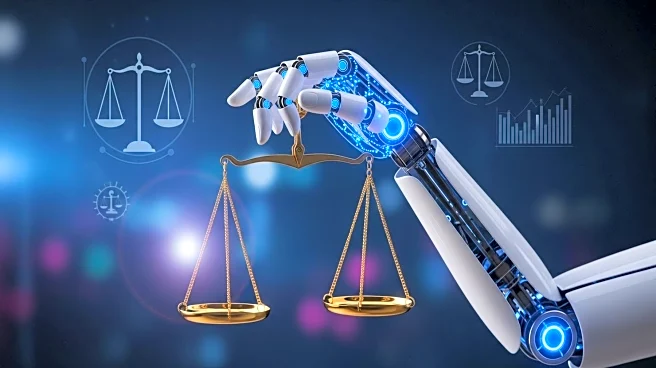What is the story about?
What's Happening?
Generative AI is becoming an integral part of the legal industry, as highlighted in a recent webinar hosted by Bloomberg Law. The event focused on the current and future applications of generative AI in legal practice, emphasizing its potential to transform the field. Legal professionals are exploring how to adapt to this technology, which is being leveraged by various legal technology providers to enhance efficiency and reduce costs. The webinar provided insights into the latest trends for 2025, discussed regulatory implications, and showcased new AI tools developed by Bloomberg Law. The event underscored the importance of AI-powered innovations in elevating legal practice.
Why It's Important?
The integration of generative AI into the legal industry signifies a major shift in how legal services are delivered. By automating routine tasks and providing advanced analytical capabilities, AI can significantly reduce operational costs and improve service delivery. This transformation is crucial for legal professionals who must adapt to remain competitive. The technology also raises important regulatory and ethical considerations, as the legal field must ensure compliance with existing laws while leveraging AI's capabilities. The broader impact includes potential changes in legal education and career paths, as new skills become necessary to work alongside AI tools.
What's Next?
As generative AI continues to evolve, legal professionals and technology providers will need to collaborate closely to address regulatory challenges and ethical concerns. Ongoing development of AI tools will likely focus on enhancing user-friendliness and ensuring compliance with legal standards. The legal industry may see increased investment in AI training programs to equip professionals with the necessary skills. Additionally, there may be a push for clearer regulations governing AI use in legal contexts, ensuring that innovations align with public policy and ethical standards.
Beyond the Headlines
The adoption of generative AI in the legal industry could lead to a reevaluation of traditional legal roles and the emergence of new career opportunities. As AI takes over more routine tasks, legal professionals may focus on higher-level strategic work, potentially leading to more fulfilling career paths. However, this shift also poses challenges, such as the need for continuous learning and adaptation to new technologies. The ethical implications of AI in legal decision-making processes will require careful consideration to maintain public trust in the legal system.















